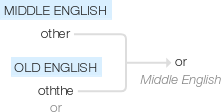Or
Middle English: a reduced form of the obsolete conjunction other (which superseded Old English oththe ‘or’), of uncertain ultimate origin.
wiktionary
From Middle English or; partially contracted from other, auther, from Old English āþor, āwþer, āhwæþer("some, any, either"; > either); and partially from Middle English oththe, from Old English oþþe, from Proto-Germanic *efþau(“or”).
From Etymology 1 (sense 2 above)
Borrowed from Middle French or(“yellow”), from Old French or, from Latin aurum(“gold”). Doublet of aurum.
Late Old English ār, from Old Norse ár. Compare ere.
etymonline
or (conj.)
c. 1200, "either, else, otherwise, as an alternative or substitute," from Old English conjunction oþþe "either, or," which is related to Old Frisian ieftha, Middle Dutch ofte, Old Norse eða, Old High German odar, German oder, Gothic aiþþau "or."
This word was extended in early Middle English (and Old High German) with an -r ending, perhaps by analogy with "choice between alternative" words that ended thus (such as either, whether); then it was reduced to oþþr, at first in unstressed positions (commonly thus in Northern and Midlands English by 1300), and finally to or, though other survived in this sense until 16c.
Compare either, which is originally the same word. The contraction took place in the second term of an alternative, such as either ... or, descended from a common construction in Old English, where both words originally were oþþe (see nor). Or else "otherwise" is by c. 1300.
